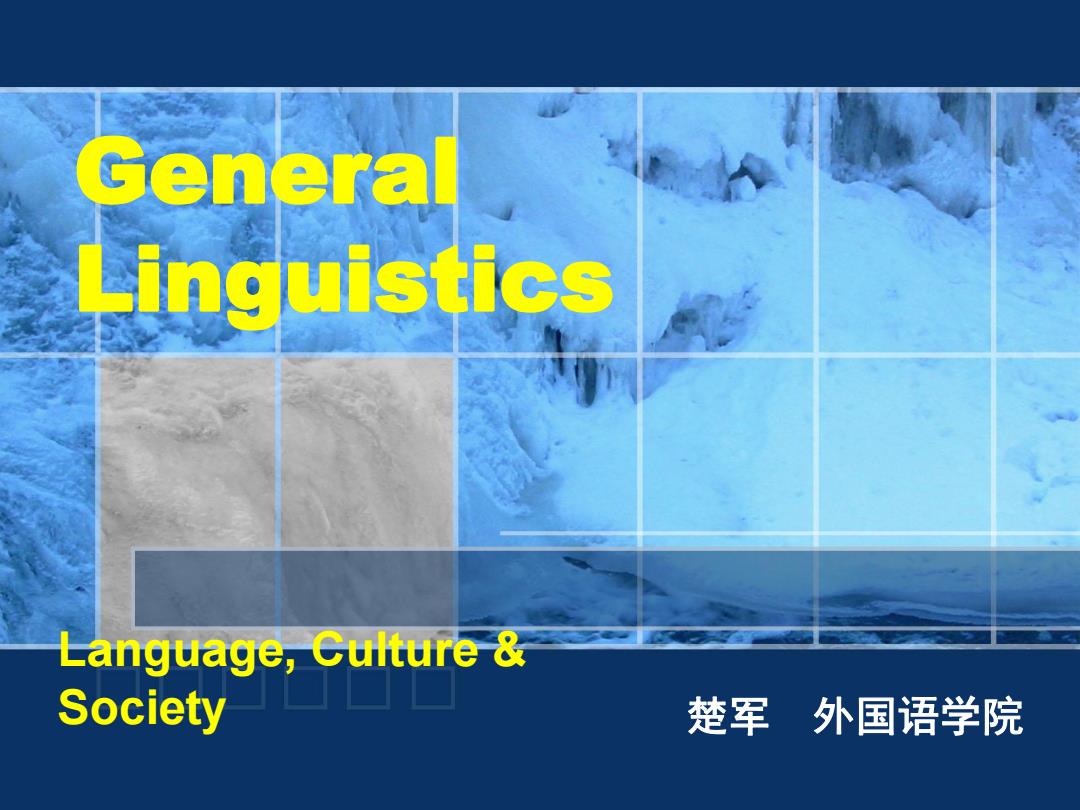
General Linguistics Language,Culture Society 楚军外国语学院
Language, Culture & Society 楚军 外国语学院 General Linguistics
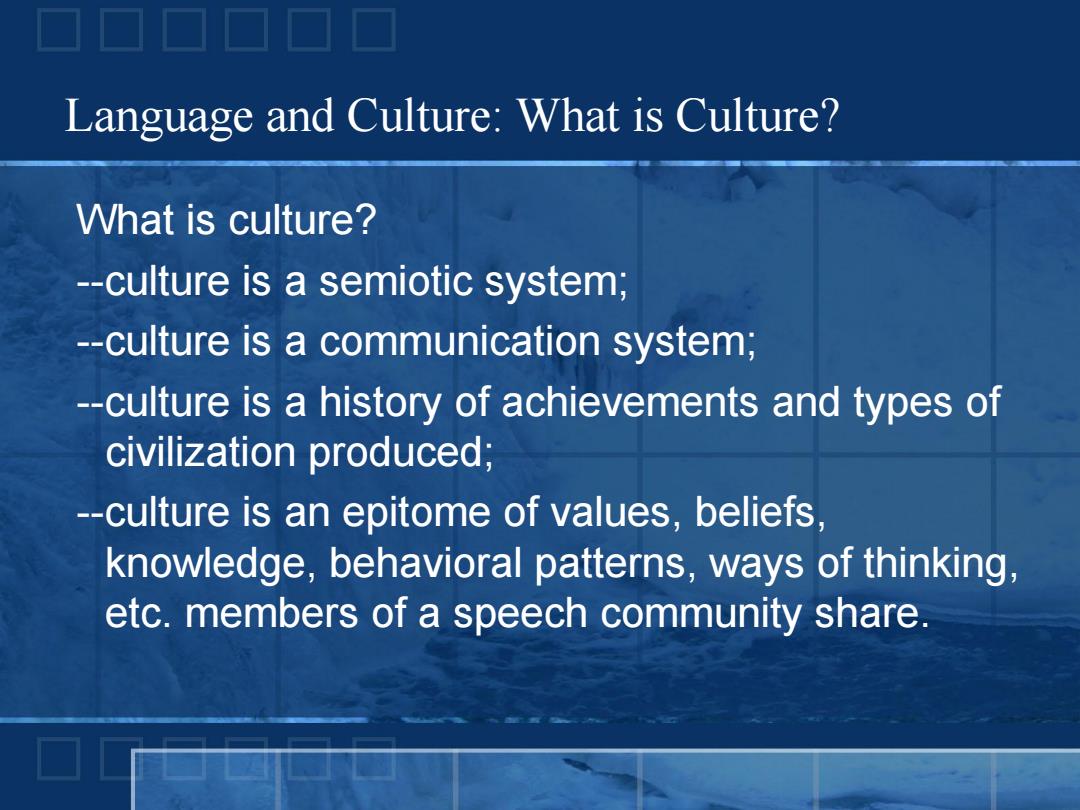
Language and Culture:What is Culture? What is culture? --culture is a semiotic system; --culture is a communication system; --culture is a history of achievements and types of civilization produced; --culture is an epitome of values,beliefs, knowledge,behavioral patterns,ways of thinking, etc.members of a speech community share
Language and Culture: What is Culture? What is culture? --culture is a semiotic system; --culture is a communication system; --culture is a history of achievements and types of civilization produced; --culture is an epitome of values, beliefs, knowledge, behavioral patterns, ways of thinking, etc. members of a speech community share
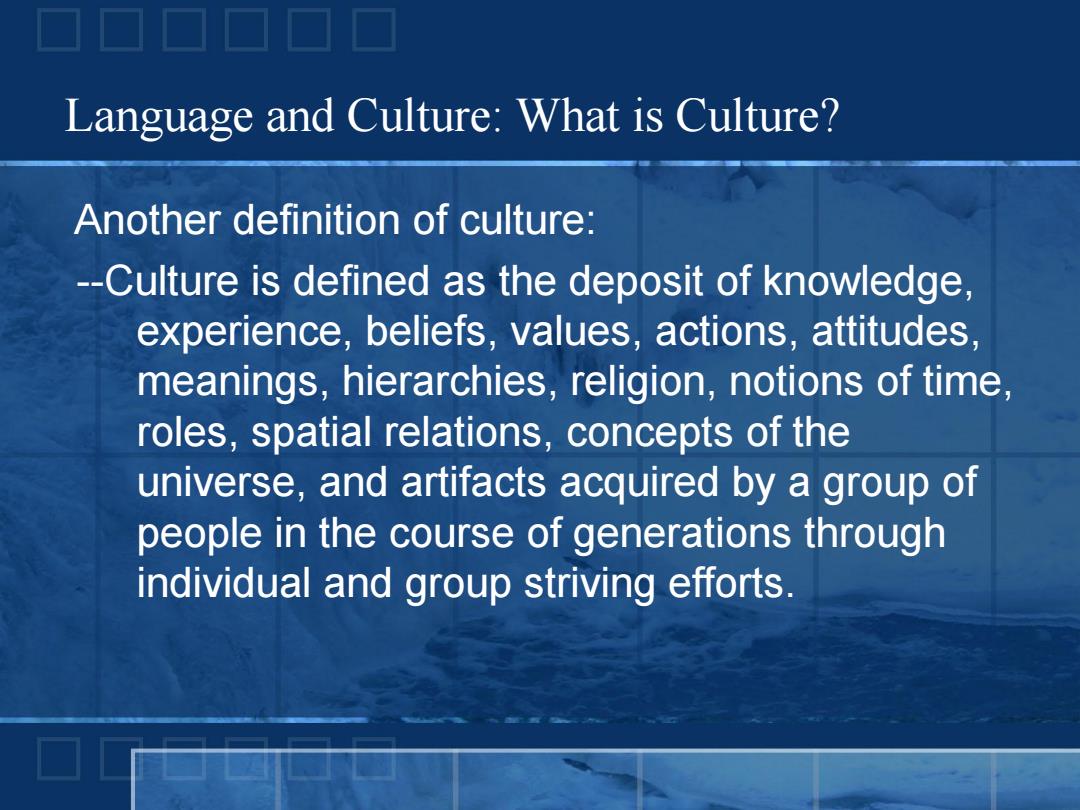
Language and Culture:What is Culture? Another definition of culture: --Culture is defined as the deposit of knowledge, experience,beliefs,values,actions,attitudes, meanings,hierarchies,religion,notions of time, roles,spatial relations,concepts of the universe,and artifacts acquired by a group of people in the course of generations through individual and group striving efforts
Language and Culture: What is Culture? Another definition of culture: --Culture is defined as the deposit of knowledge, experience, beliefs, values, actions, attitudes, meanings, hierarchies, religion, notions of time, roles, spatial relations, concepts of the universe, and artifacts acquired by a group of people in the course of generations through individual and group striving efforts

Language and Culture:What is Culture? .Major characteristics of culture: 1)Culture is learned (through proverbs,folk tales, legends,myths,art,mass media); 2)Culture is transmitted from generation to generation; 3)Culture is based on symbols; 4)Culture is subject to change; 5)Culture is integrated; 6)Culture is ethnocentric; 7)Culture is adaptive
Language and Culture: What is Culture? • Major characteristics of culture: 1) Culture is learned (through proverbs, folk tales, legends, myths, art, mass media); 2) Culture is transmitted from generation to generation; 3) Culture is based on symbols; 4) Culture is subject to change; 5) Culture is integrated; 6) Culture is ethnocentric; 7) Culture is adaptive
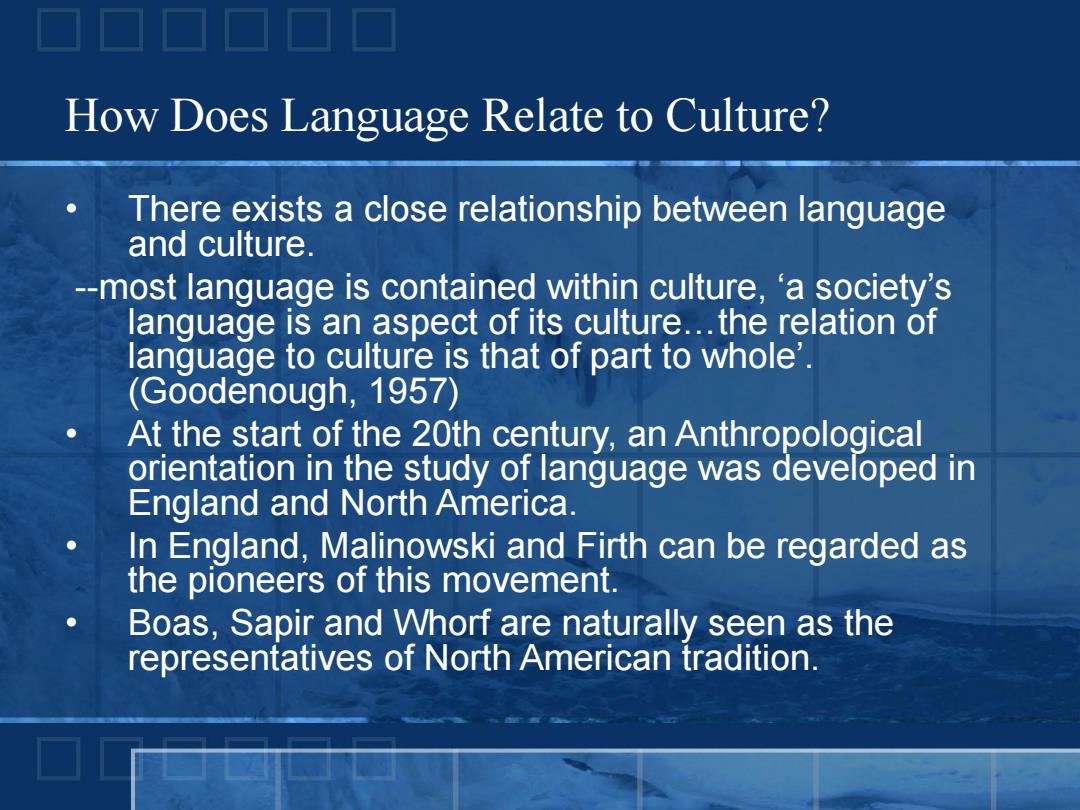
How Does Language Relate to Culture? There exists a close relationship between language and culture. --most language is contained within culture,'a society's language is an aspect of its culture...the relation of language to culture is that of part to whole'. (Goodenough,1957) At the start of the 20th century,an Anthropological orientation in the study of language was developed in England and North America. In England,Malinowski and Firth can be regarded as the pioneers of this movement. Boas,Sapir and Whorf are naturally seen as the representatives of North American tradition
How Does Language Relate to Culture? • There exists a close relationship between language and culture. --most language is contained within culture, ‘a society’s language is an aspect of its culture…the relation of language to culture is that of part to whole’. (Goodenough, 1957) • At the start of the 20th century, an Anthropological orientation in the study of language was developed in England and North America. • In England, Malinowski and Firth can be regarded as the pioneers of this movement. • Boas, Sapir and Whorf are naturally seen as the representatives of North American tradition
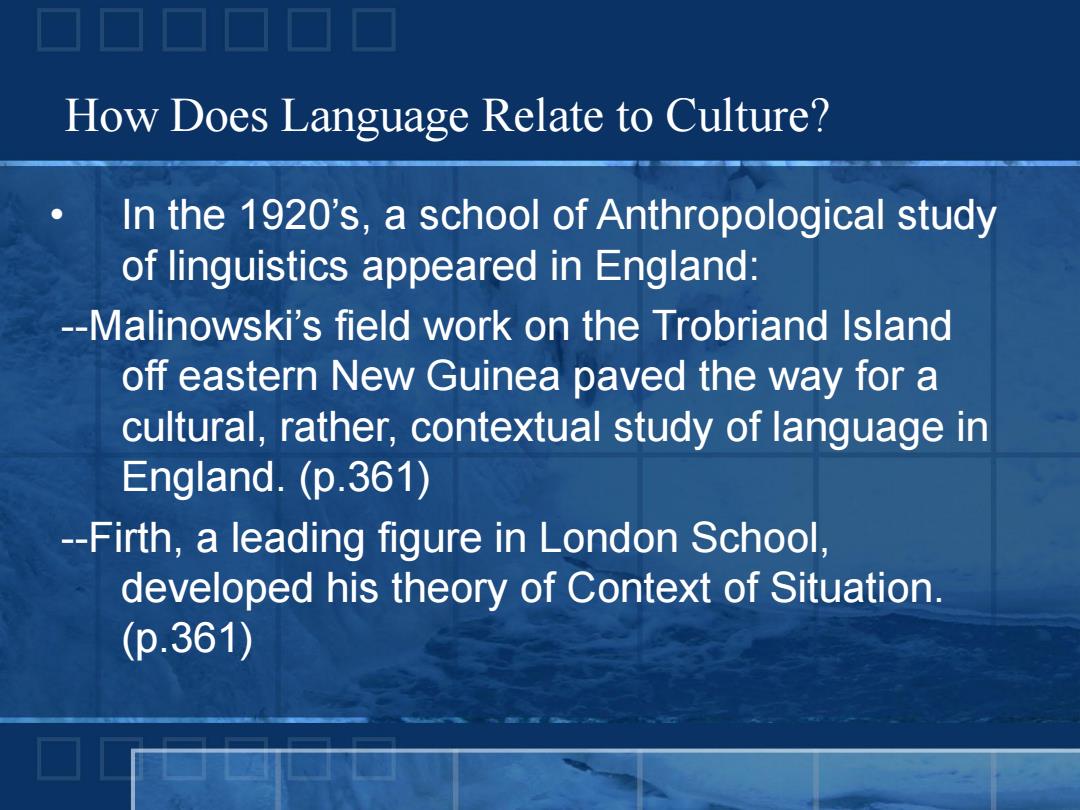
How Does Language Relate to Culture? In the 1920's,a school of Anthropological study of linguistics appeared in England: --Malinowski's field work on the Trobriand Island off eastern New Guinea paved the way for a cultural,rather,contextual study of language in England.(p.361) --Firth,a leading figure in London School, developed his theory of Context of Situation. (p.361)
How Does Language Relate to Culture? • In the 1920’s, a school of Anthropological study of linguistics appeared in England: --Malinowski’s field work on the Trobriand Island off eastern New Guinea paved the way for a cultural, rather, contextual study of language in England. (p.361) --Firth, a leading figure in London School, developed his theory of Context of Situation. (p.361)
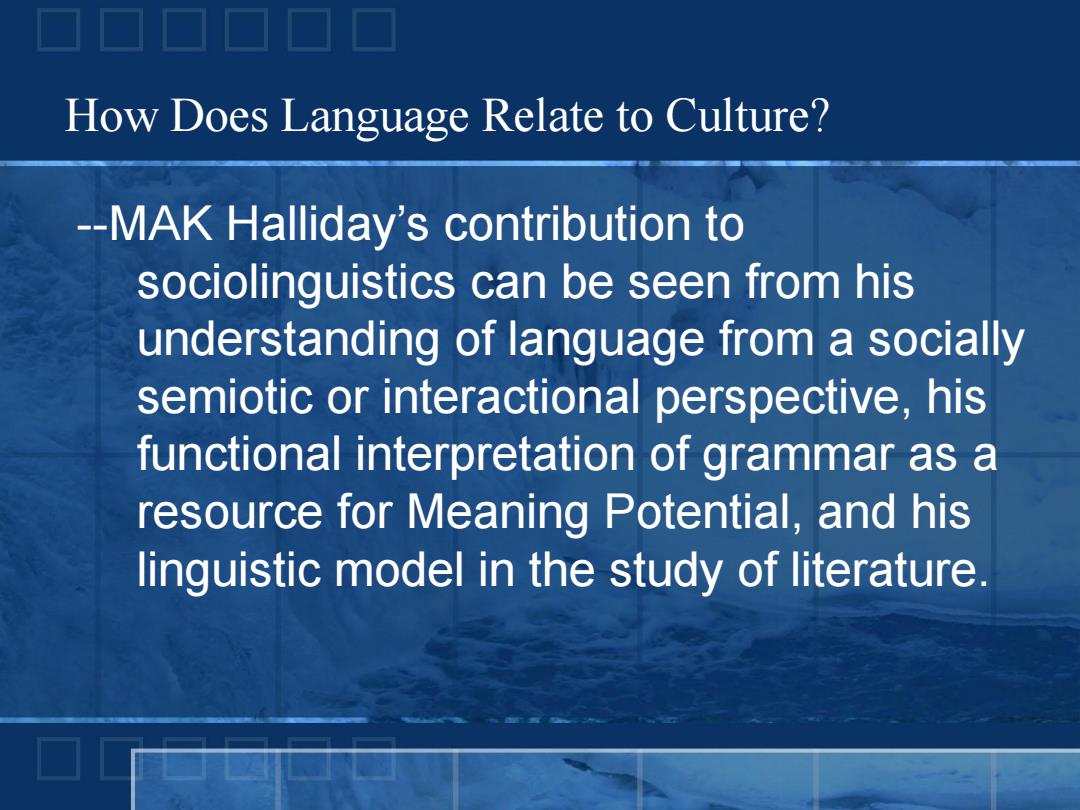
How Does Language Relate to Culture? --MAK Halliday's contribution to sociolinguistics can be seen from his understanding of language from a socially semiotic or interactional perspective,his functional interpretation of grammar as a resource for Meaning Potential,and his linguistic model in the study of literature
How Does Language Relate to Culture? --MAK Halliday’s contribution to sociolinguistics can be seen from his understanding of language from a socially semiotic or interactional perspective, his functional interpretation of grammar as a resource for Meaning Potential, and his linguistic model in the study of literature
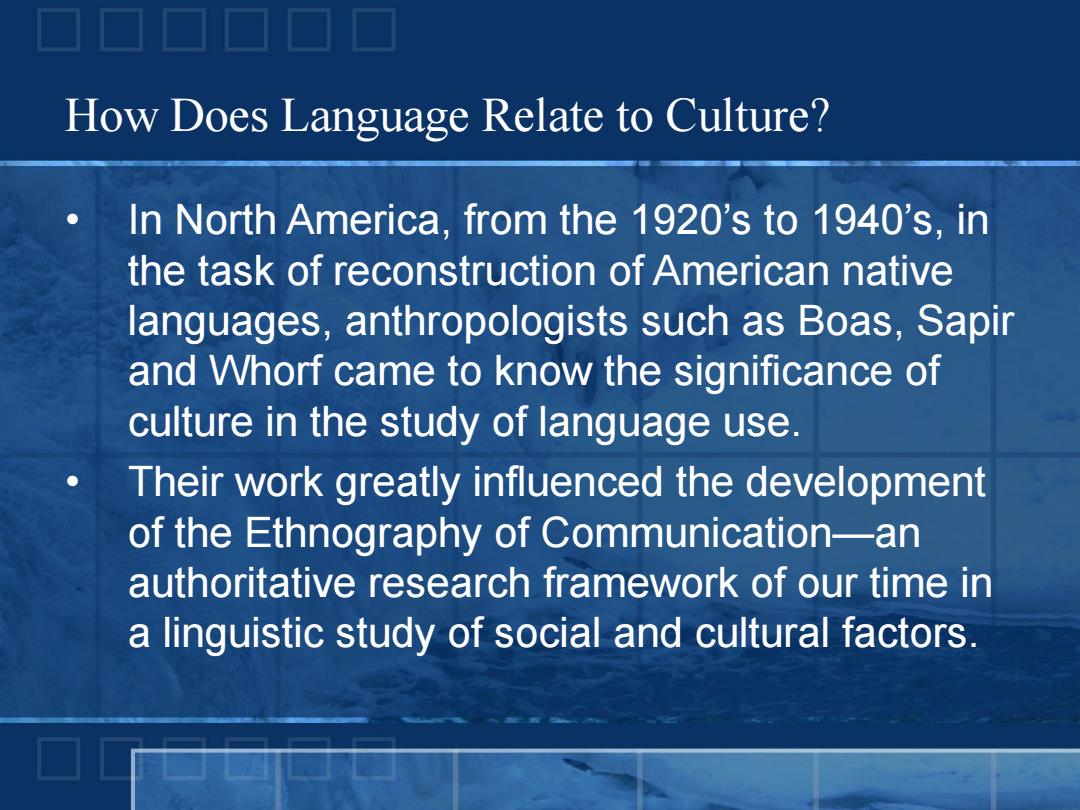
How Does Language Relate to Culture? In North America,from the 1920's to 1940's,in the task of reconstruction of American native languages,anthropologists such as Boas,Sapir and Whorf came to know the significance of culture in the study of language use. Their work greatly influenced the development of the Ethnography of Communication-an authoritative research framework of our time in a linguistic study of social and cultural factors
How Does Language Relate to Culture? • In North America, from the 1920’s to 1940’s, in the task of reconstruction of American native languages, anthropologists such as Boas, Sapir and Whorf came to know the significance of culture in the study of language use. • Their work greatly influenced the development of the Ethnography of Communication—an authoritative research framework of our time in a linguistic study of social and cultural factors
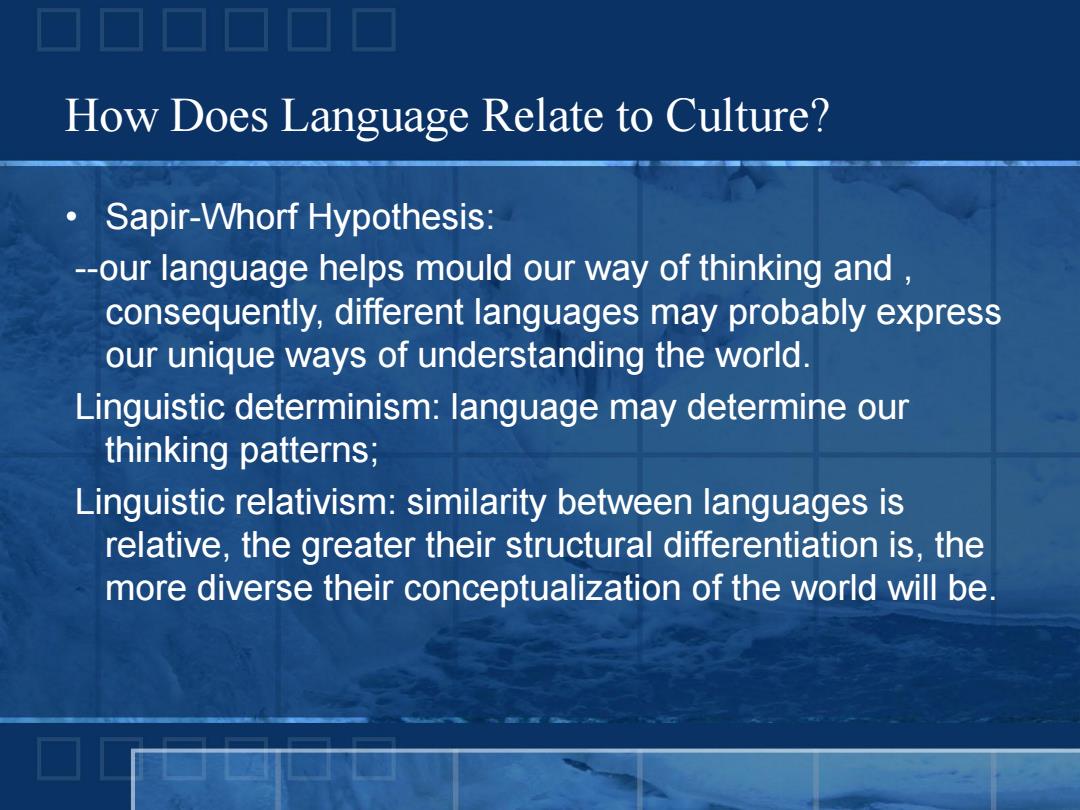
How Does Language Relate to Culture? Sapir-Whorf Hypothesis: --our language helps mould our way of thinking and consequently,different languages may probably express our unique ways of understanding the world. Linguistic determinism:language may determine our thinking patterns; Linguistic relativism:similarity between languages is relative,the greater their structural differentiation is,the more diverse their conceptualization of the world will be
How Does Language Relate to Culture? • Sapir-Whorf Hypothesis: --our language helps mould our way of thinking and , consequently, different languages may probably express our unique ways of understanding the world. Linguistic determinism: language may determine our thinking patterns; Linguistic relativism: similarity between languages is relative, the greater their structural differentiation is, the more diverse their conceptualization of the world will be
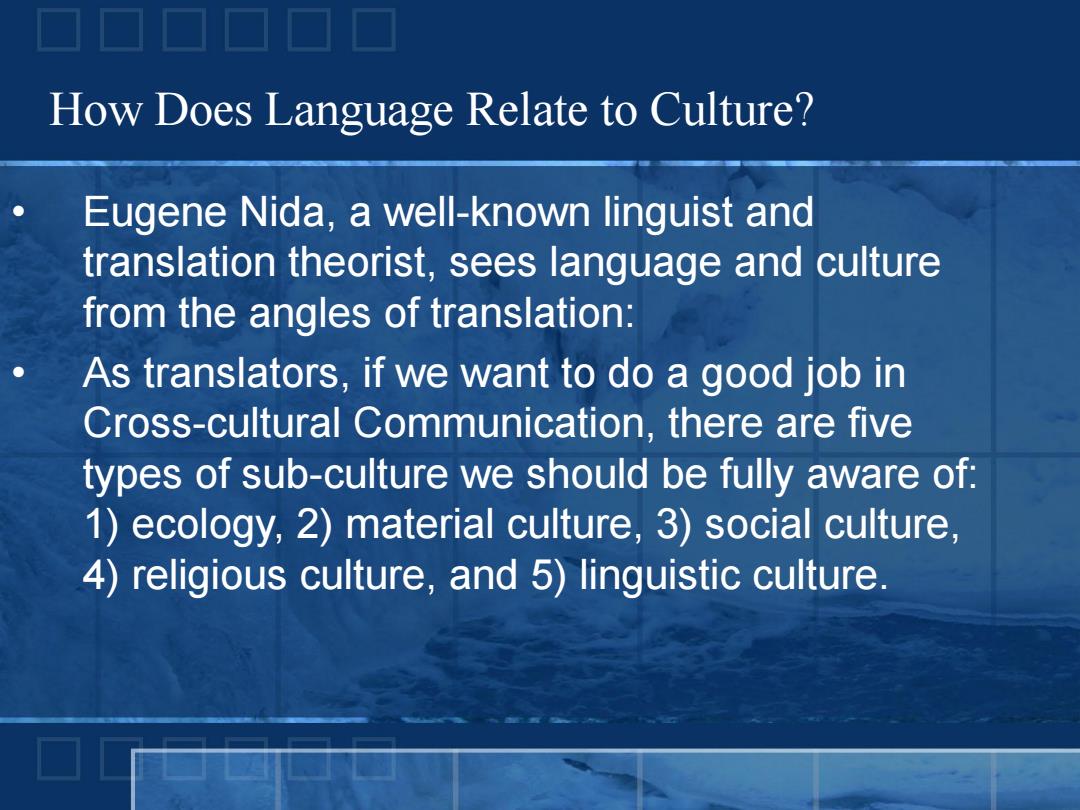
How Does Language Relate to Culture? Eugene Nida,a well-known linguist and translation theorist,sees language and culture from the angles of translation: As translators,if we want to do a good job in Cross-cultural Communication,there are five types of sub-culture we should be fully aware of: 1)ecology,2)material culture,3)social culture, 4)religious culture,and 5)linguistic culture
How Does Language Relate to Culture? • Eugene Nida, a well-known linguist and translation theorist, sees language and culture from the angles of translation: • As translators, if we want to do a good job in Cross-cultural Communication, there are five types of sub-culture we should be fully aware of: 1) ecology, 2) material culture, 3) social culture, 4) religious culture, and 5) linguistic culture